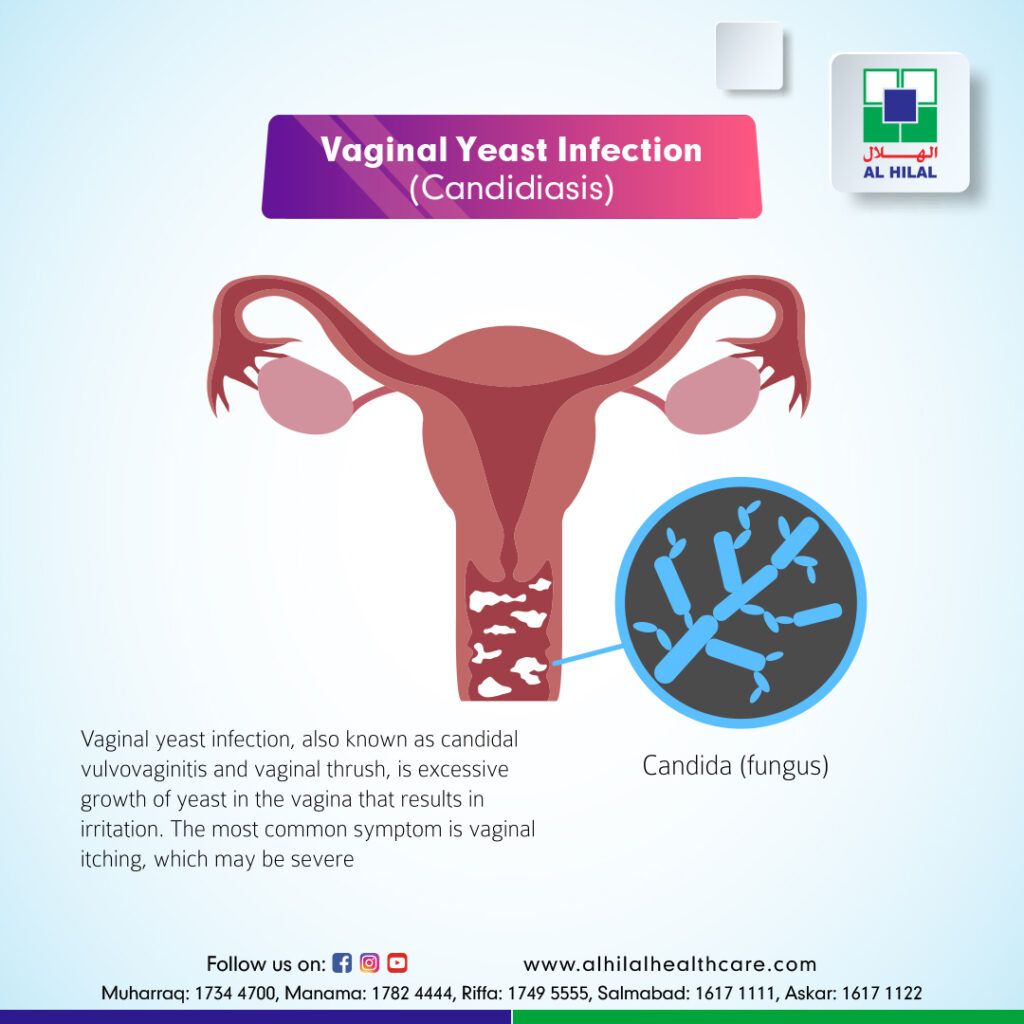Yeast is a fungus commonly found on your skin. However, it is also found in your digestive system. If you are a woman, you also have yeast in your vaginal area. When too much yeast grows on your skin or other places, it can cause an infection. This infection is also called Candidiasis.

A vaginal yeast infection is a fungal infection that causes discharge, irritation, and intense itchiness of the vagina and the vulva. Also called vaginal Candidiasis, Vaginal yeast infection is also called Vaginal Candidiasis, which affects up to 3 out of 4 women at some stage in their lifetimes.
What are the types of Yeast infections?
- Candidiasis of the Skin:
A superficial skin infection is a common area for this fungal infection. The lesions appear as red, well-circumscribed, sometimes itchy patches of varying shapes and sizes. The lesions are usually rimmed with minor, red-based blemishes, and they commonly occur in folds of the skin, i.e., under the breasts, underarms, the navel, groin, or the folds of the buttocks, or the webbing between the fingers and toes. Crusts may form on the scalp, possibly causing loss of hair. The infection may spread to the fingertips, face, or trunk. The infection is called Perianal Candidiasis when the area around the anus is involved.
- Vulvovaginitis or Vaginitis caused by Candida:
Women with diabetes or pregnant women are prone to this fungal infection. It usually first appears as a thick yellow or white vaginal discharge with redness and itching of the female genitalia.
- Penis, infected by Candida:
Infection of the penis tip (Glans Penis) with Candida bacteria is not as common as Candidal Vaginitis. However, this infection may be seen in men with Diabetes Mellitus and men whose sexual partners have Candidal Vulvovaginitis.
- Oral Candidiasis (Thrush):
This form of Candidiasis gets affected in the mouth. It usually first appears as sores or creamy white patches on the tongue or mucous membranes of the mouth. The condition is called Perleche, when the corners of the mouth are red (inflamed), eroded, and cracked because of a Candida infection.
- Candida infection around the nails (Candidal Paronychia):
This form of the may begin as a painful swelling that later develops into pus. The infections may occur under the nails, possibly causing loss of toenails or fingernails.
- Chronic Mucocutaneous Candidiasis (Candida Granuloma):
This is a severe and rare form of Candidiasis, characterized by chronic infection of the nails, scalp, mucous membranes, and skin. It is characterized by red, pustular, crusted, thickened lesions, especially on the nose and forehead.
- Systemic Candidiasis:
This most severe Candia infection affects many parts of the body and is usually caused by an immune deficiency. In addition, the membrane lining the skull, inflammation of the membrane lining the heart, or rarely inflammation of the bone may also occur.
WHAT CAUSES A YEAST INFECTION?
Candida albicans is the most common type of fungus that causes yeast infections.
Overgrowth of the yeast can result from:
- Antibiotic use causes an imbalance in natural vaginal flora
- Pregnancy
- Uncontrolled diabetes
- An impaired immune system.
- Taking oral contraceptives or hormone therapy that increases estrogen levels.
The fungus candida Albicans is responsible for most vaginal yeast infections.
Your vagina naturally contains a balanced yeast mix, including Candida and bacteria. In addition, certain bacteria (lactobacillus) act to prevent an overgrowth of yeast.
But that balance can be disrupted. For example, an overgrowth of Candida or penetration of the fungus into deeper vaginal cell layers causes the symptoms and signs of a yeast infection.
WHAT ARE THE SYMPTOMS OF VAGINAL CANDIDIASIS?
- A burning sensation, especially while urinating or during intercourse.
- Irritation and itching in the vagina and vulva
- Redness and swelling of the vulva
- Vaginal pain and soreness
- Vaginal rash
- Discharge due to a yeast infection often causes thick, white, clumpy vaginal discharge that usually doesn’t smell (or only smells slightly different than usual).
WHAT IS THE TREATMENT GIVEN?
Treatment for the vaginal yeast infection can be done with an antifungal medication.
There are two forms of Medication: Topical and Oral.
Topical medicines are applied to the affected area, while oral medications are taken by the mouth. Topical medications may include nystatin, boric acid, clotrimazole, or miconazole. Your doctor will give you information about each form of medicine and directions on properly using each one. It is essential to always follow your provider’s instructions when using these medications to ensure that the infection is fully settled and doesn’t return.
WHO WILL NEED TREATMENT?
If any of these three cases sounds like yours, you need a doctor’s notice:
- You have the yeast infection for the first time. See a doctor and ensure it’s not a more severe problem that needs an entirely different treatment, such as STI or a urinary tract infection.
- You’re pregnant. Any medications require to be approved by the doctor during your pregnancy.
- You get the yeast infection frequently. If you are affected by four or more yeast infections in a year, it is called “recurrent vulvovaginal candidiasis.” You’ll need treatment for up to 6 months with an antifungal medication if you have it. Frequent yeast infections can also signify that you have diabetes or another medical condition.
WHAT ARE THE RESULTS OF THE TREATMENT AVAILABLE?
Most patients may ask when I will feel better. Most yeast infections vanish away within a few days of starting medication. However, you may continue to feel irritated and itchy even after the infection is gone. If you do not get better within a few days after finishing treatment, you need to see your doctor again.
YEAST INFECTION TREATMENT IN BAHRAIN:
Al Hilal Hospital is the largest and fastest-growing chain of private healthcare providers in Bahrain, with five branches. Al Hilal Healthcare Group is committed to providing high-quality healthcare services at an affordable price to the people of Bahrain through a combination of superior medical technology and excellent clinical services. Its vision is to be the largest healthcare service provider in the region by catering to the needy at the most affordable rates.
The Department of Obstetrics and Gynecology has been providing comprehensive healthcare for women. As a result, the healthcare group has successfully treated many female-oriented diseases like Yeast Infection.
YEAST INFECTION SPECIALIST IN BAHRAIN:
Al Hilal Healthcare group is equipped with several well-qualified and experienced Gynecologists who are specialists in treating Yeast Infection among women.


